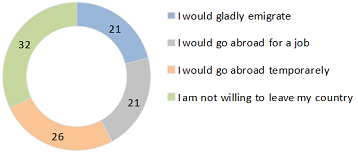Within further evaluation of happiness in Moldova, where 64% of respondents declared themselves happy, we want to introduce another theme reported in this issue - the desire to go abroad. This research is based on data from the Magenta National Screening by Magenta Consulting conducted quarterly, on a sample of 1400 respondents in 24 urban communities.
 Such an optimistic picture leaves us stupefied face to face with the responses to the question "Would you like to go abroad?” 68% said they want to leave the country with different purposes. 40% of people who feel happy would leave the country, 52% of those who feel averagely happy also would leave the country, and among those who feel unhappy 61% would leave. No matter how happy the citizens of Moldova declare themselves only 32% are not willing to go anywhere, 26% would leave temporarily (education, visits, trips), and the idea of going abroad in search of a job is common for 21% of respondents, still other 21% of respondents would emigrate with pleasure.
Such an optimistic picture leaves us stupefied face to face with the responses to the question "Would you like to go abroad?” 68% said they want to leave the country with different purposes. 40% of people who feel happy would leave the country, 52% of those who feel averagely happy also would leave the country, and among those who feel unhappy 61% would leave. No matter how happy the citizens of Moldova declare themselves only 32% are not willing to go anywhere, 26% would leave temporarily (education, visits, trips), and the idea of going abroad in search of a job is common for 21% of respondents, still other 21% of respondents would emigrate with pleasure.
Most (58%) of those who wish to migrate are young people aged 14-29 years. Among those who want to find a job abroad only 39% are young people aged 14-29 years, most (61%) are persons under the age of 30 years. However, among those who would leave the country, most are adults over 30 years. Taken separately, all age segments, 49% of adolescents and 51% of young people aged 20-29 years would leave the country. In what regards the young people over 30 years and adults over 45 years, the rate of those who would like to go to work or migrate abroad is more modest 39% and 32% correspondingly.
It is interesting that the desire to migrate is inversely proportionate to age. In other words, the younger age of respondent, the greater the desire to emigrate and vice versa. Age differences reported to the desire to leave may be explained from the perspectives of socio-economic status and the opportunities existing for each of these segments in the country.
Another important index that seems to relate to the desire to leave the country is the education level of respondents. The highest shares of people who would like to go to work or migrate abroad are recorded among respondents with incomplete secondary education, 52%. They are followed by respondents with secondary education, 46%. People with higher education and postgraduate degrees are less interested in these opportunities 39% and 25% would opt for departure. Most people who would go abroad temporarily (68) have higher and postgraduate education.
It is clear that with regard to the revenues, the data is inversely proportional to its size, for those who want to emigrate or to go to work abroad. Those who would leave for a period of time stated higher revenues. If in the previous article we said that the happiest respondents are from relatively large families - 4 persons, namely respondents from these families expressed the highest desire to emigrate or to go to work abroad. Obviously, people dont go for pleasure but rather the socio-economic- political-cultural situation forces them, especially in conditions where there is an offer to improve quality of life. Perhaps the opportunity to leave, personal experience or of the people they known can explain the desire of Moldovan citizens to leave. During the past 16 years, marked by transition, the phenomenon of emigration in Moldova has become so common that practically every citizen knows at least one person who emigrated.
The crisis affecting the global economy since the second half of 2008, has considerably affected the labor market. As a result, economic growth of recent years in Moldova, due to remittances, began recording a huge decline. Reducing labor demands and tightening laws on immigration (eg Italy, Spain, and Netherlands etc.) make many fellow citizens face absence of alternatives; they are forced to return home. According to the National Bureau of Statistics the number of Moldovans working abroad decreased from 340.000 in 2008 to 272.500 in 2009. IOM research shows that in March 2009, the share of Moldovans who receive money from relatives abroad decreased by 20% compared with 2008. On the background of economic crisis which was recently formalized in Moldova, the number of migrants returned home, decreased remittances, the population of Moldova anticipates a series of expenditure reductions.
Happy, on the one hand, but willing to emigrate, on the other, however, the citizens of the country show their hope for the future. Those who had to return home because of unemployment abroad bring knowledge in various areas - either in academic field or in construction - but surely this knowledge will contribute to the countrys development and the development of the family where they return.
 Download PDF
Download PDF